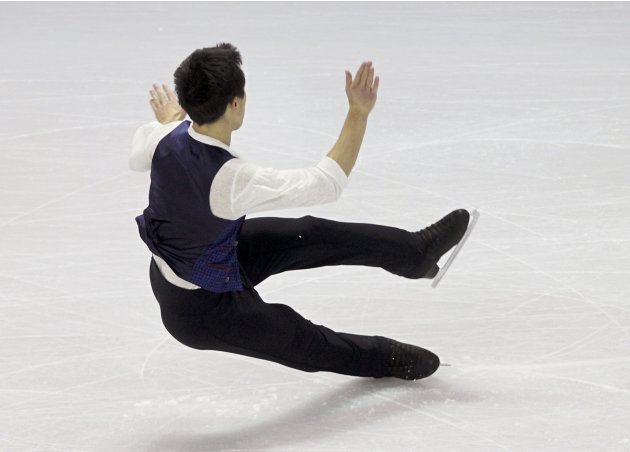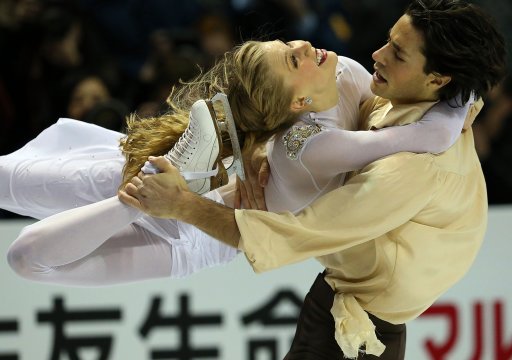- Joined
- Aug 3, 2008
- Messages
- 23,454
- Points
- 0
Fxxking Canadians
Before 2002, figure skating were happily using 6 points system: 6 points is perfection, 4 points very bad.
Everyone understand the system.
Then one day in 2002, Canadian pair of Jamie Sale and David Pelletier skated a program with no fall, but lost to
Russian pair of Elena Berezhnaya and Anton Sikharulidze with a fall. The russian had better quality skating.
The stupid canadians complain and the ISU leadership were stunted. They gave both pair olympic gold and when into hidding for months and create a new scoring system.
After that, nobody understand the fxxking system. They made it so complex and add new rules that pack the program with compulsory routines. With points like 267.78, who understand the scoring system.
Yesterday, the canadian man skater fall like 10 times on the ice and he still won gold. For the scoring system to solve the problem of one fall vs flawless program, it is a disaster. No one understand the scoring system. Did the canadian complain now? No, since their skater won, they made zero complain.
Stupid canadian you killed figure skating, men skating was improving lead and bound in 90's and reach the peak in 2002, and because of you, the men skating fxxk up. The skating in 2013 is worse than 2002 for men skating. That is a crying shame. No one understand why the men gold awarded to someone who fall 10 times on the ice.


-----------------------------------------------------------------------------------------------------------------
Patrick Chan captures 3rd straight world figure skating title
Canada's Patrick Chan skated to his third world figure skating title.
Then he apologized to the crowd.
The 22-year-old from Toronto won gold Friday to become the first men's singles skater in 13 years to win three in a row.
But when he stuck his toe pick in the ice and struck his final pose, his face fell in disappointment and he smacked a palm several times to his forehead.
Victory No. 3 was far from an easy one for Chan on a night few skaters in the men's field performed well, and 19-year-old Denis Ten of Kazakhstan stole the spotlight.
"I'm sorry I didn't give you a good program," Chan told the 6,600 fans that were on their feet regardless. "I wanted to do it so badly."
Ten captured the silver, while Javier Fernandez of Spain claimed the bronze.
Kevin Reynolds of Coquitlam, B.C., finished fifth.
Thanks to a world-record short program, Chan took a huge seven-point lead into a free skate that was indicative of his topsy-turvy season — an error-filled four-and-half minutes to "La Boheme" that included a couple of falls and downgraded jumps.
"I definitely was disappointed in myself because I really wanted to go out there and have a short program moment," he said. "The moment wasn't as good as it could have been, but it was nonetheless very special."
Dressed in a V-neck white shirt under a blue vest, Chan opened with two huge quads and looked headed for certain victory. But he had uncharacteristic fall on a triple Lutz, a jump he could land in his sleep, then went splat on his triple Axel — the jump that's always been his nemesis — en route to 267.78 points.
The thought did cross Chan's mind near the end of the program that he might not win.
"I was really, really bummed, because I realized, 'Oh my gosh, it would be awful if I end on a bad note, because of all the mistakes I made.' I had to forget about it and refocus finishing the program strong. I was fighting it the whole time, I felt the program was going by really slowly.
"Count my stars, I'm pretty lucky."
Chan had hoped a strong performance in London would be the perfect springboard into the Sochi Olympic season. This season has been anything but strong, starting with a second-place performance at Skate Canada in the fall — his first loss in a major international event in almost two years. Then he finished third at the Grand Prix Final.
Three weeks before the world championships, he upped and moved from Colorado Springs to Detroit.
"I think this season I gained the most experience, second to probably Olympic Games in Vancouver because this whole season I've been trying to catch my feet, and trying to discover myself in a way, and why I was having such an odd time on the ice," he said. "I wasn't excited to compete or train or anything."
Chan decided to trust his instincts, he said, and take a leap of faith in moving to Detroit.
"I used to believe that competing was a matter of luck and hoping I would land on my feet. That's definitely not the case for me anymore," he said. "If I put in the work, I'll get the success that I want."
The 19-year-old Ten had the skate of the night, an entertaining and athletically impressive performance to "The Artist" en route to scoring 266.48 overall. He pumped his fist after landing his quad, then delighted the crowd afterward when he crouched on all fours and kissed the Budweiser Gardens ice afterward.
It was Kazakhstan's first world championship medal.
"My dream came true," Ten said. "I still cannot believe it happened. What's more important is it's the first medal for my country and I'm really proud of it."
There was obvious disappointment on Reynolds' face when the 22-year-old heard his scores. Reynolds, who sat third after the short program, landed two quads, one with a shaky landing, but downgraded a couple of other jumps.
"I felt a lot of pressure skating in the last position," said Reynolds, who was the last up on the night. "It's the first time for me, such a high-pressure situation. Considering all of that, I am pleased with my performance."
Before 2002, figure skating were happily using 6 points system: 6 points is perfection, 4 points very bad.
Everyone understand the system.
Then one day in 2002, Canadian pair of Jamie Sale and David Pelletier skated a program with no fall, but lost to
Russian pair of Elena Berezhnaya and Anton Sikharulidze with a fall. The russian had better quality skating.
The stupid canadians complain and the ISU leadership were stunted. They gave both pair olympic gold and when into hidding for months and create a new scoring system.
After that, nobody understand the fxxking system. They made it so complex and add new rules that pack the program with compulsory routines. With points like 267.78, who understand the scoring system.
Yesterday, the canadian man skater fall like 10 times on the ice and he still won gold. For the scoring system to solve the problem of one fall vs flawless program, it is a disaster. No one understand the scoring system. Did the canadian complain now? No, since their skater won, they made zero complain.
Stupid canadian you killed figure skating, men skating was improving lead and bound in 90's and reach the peak in 2002, and because of you, the men skating fxxk up. The skating in 2013 is worse than 2002 for men skating. That is a crying shame. No one understand why the men gold awarded to someone who fall 10 times on the ice.


-----------------------------------------------------------------------------------------------------------------
Patrick Chan captures 3rd straight world figure skating title
Canada's Patrick Chan skated to his third world figure skating title.
Then he apologized to the crowd.
The 22-year-old from Toronto won gold Friday to become the first men's singles skater in 13 years to win three in a row.
But when he stuck his toe pick in the ice and struck his final pose, his face fell in disappointment and he smacked a palm several times to his forehead.
Victory No. 3 was far from an easy one for Chan on a night few skaters in the men's field performed well, and 19-year-old Denis Ten of Kazakhstan stole the spotlight.
"I'm sorry I didn't give you a good program," Chan told the 6,600 fans that were on their feet regardless. "I wanted to do it so badly."
Ten captured the silver, while Javier Fernandez of Spain claimed the bronze.
Kevin Reynolds of Coquitlam, B.C., finished fifth.
Thanks to a world-record short program, Chan took a huge seven-point lead into a free skate that was indicative of his topsy-turvy season — an error-filled four-and-half minutes to "La Boheme" that included a couple of falls and downgraded jumps.
"I definitely was disappointed in myself because I really wanted to go out there and have a short program moment," he said. "The moment wasn't as good as it could have been, but it was nonetheless very special."
Dressed in a V-neck white shirt under a blue vest, Chan opened with two huge quads and looked headed for certain victory. But he had uncharacteristic fall on a triple Lutz, a jump he could land in his sleep, then went splat on his triple Axel — the jump that's always been his nemesis — en route to 267.78 points.
The thought did cross Chan's mind near the end of the program that he might not win.
"I was really, really bummed, because I realized, 'Oh my gosh, it would be awful if I end on a bad note, because of all the mistakes I made.' I had to forget about it and refocus finishing the program strong. I was fighting it the whole time, I felt the program was going by really slowly.
"Count my stars, I'm pretty lucky."
Chan had hoped a strong performance in London would be the perfect springboard into the Sochi Olympic season. This season has been anything but strong, starting with a second-place performance at Skate Canada in the fall — his first loss in a major international event in almost two years. Then he finished third at the Grand Prix Final.
Three weeks before the world championships, he upped and moved from Colorado Springs to Detroit.
"I think this season I gained the most experience, second to probably Olympic Games in Vancouver because this whole season I've been trying to catch my feet, and trying to discover myself in a way, and why I was having such an odd time on the ice," he said. "I wasn't excited to compete or train or anything."
Chan decided to trust his instincts, he said, and take a leap of faith in moving to Detroit.
"I used to believe that competing was a matter of luck and hoping I would land on my feet. That's definitely not the case for me anymore," he said. "If I put in the work, I'll get the success that I want."
The 19-year-old Ten had the skate of the night, an entertaining and athletically impressive performance to "The Artist" en route to scoring 266.48 overall. He pumped his fist after landing his quad, then delighted the crowd afterward when he crouched on all fours and kissed the Budweiser Gardens ice afterward.
It was Kazakhstan's first world championship medal.
"My dream came true," Ten said. "I still cannot believe it happened. What's more important is it's the first medal for my country and I'm really proud of it."
There was obvious disappointment on Reynolds' face when the 22-year-old heard his scores. Reynolds, who sat third after the short program, landed two quads, one with a shaky landing, but downgraded a couple of other jumps.
"I felt a lot of pressure skating in the last position," said Reynolds, who was the last up on the night. "It's the first time for me, such a high-pressure situation. Considering all of that, I am pleased with my performance."
Last edited:












































